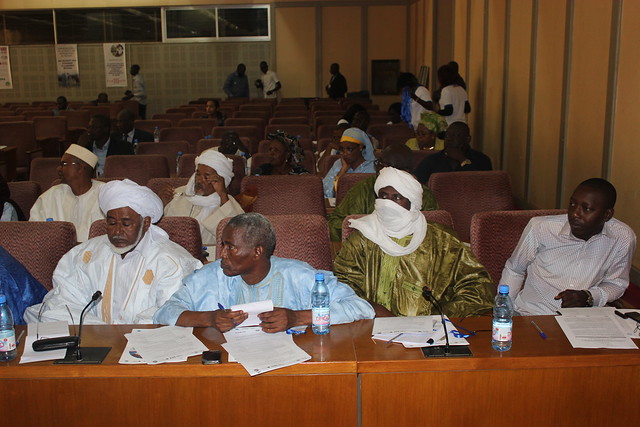West African networks agree to defend pastoralism
Bamako meeting lays out roadmap for collaboration

The Touareg, Fulani and other pastoralists in West and Central Africa face many challenges: barriers to their mobility, poor security, uncertain land governance, climate change, rapid population growth and inadequate social and financial services.
The four biggest networks of livestock herders in the region have now agreed to collaborate more closely to advocate pastoralism. The four organizations, APESS, CORET, RBM and ROPPA, together represent millions of pastoralists and livestock keepers in the region. At a meeting in Bamako on 7–9 January 2016, they set the objectives and next steps of a consultation framework originally launched in 2012.
Over 90 representatives from a range of stakeholders attended the Bamako meeting on “Building a favourable environment for the development of pastoralism in West and Central Africa”.
"Pastoralism is under threat. Not a single day passes without a person eating an animal product. We therefore need a clear policy to support pastoralism in order to assure food security" said Lamido Issa Bi Amadou, the president of the National Federation of Central African Farmers, who attended the meeting.
The representatives agreed on the consultation framework to increase dialogue and reduce conflicts over land, water and animals. Its objectives are to defend the interests of pastoralists and livestock breeders, influence public policies, raise awareness on the importance of pastoralism for society, the economy and the environment, and improve information on pastoralism. The representatives want to increase the role and capability of the framework to reach these goals.
The framework is open to other organizations with similar objectives. It aims to find ways to include women more strongly.
|
West African networks present at Bamako meeting |
|
|
APESS |
Association pour la Promotion de l'Elevage en Savane et dans le Sahel |
|
CORET |
Confederation of Traditional Herder Organizations in Africa |
|
RBM |
Réseau Billital Maroobé |
|
ROPPA |
Réseau des organisations paysannes et de producteurs de l'Afrique de l'Ouest |
Building a common vision
Hopes for collaboration among pastoralists and other stakeholders in the region face major hurdles. A lack of a common vision, a scarcity of data on pastoral systems, and insecurity in pastoral and border areas are among the biggest constraints.
The meeting nominated a group of the biggest pastoral networks and four international organizations to set up a steering committee, secretariat and focal points in each country. The group will organize a regional gathering to formally establish the consultation framework.
The representatives drafted the “Bamako Declaration”, inviting governments, technical and financial partners to design policies and promote dialogue among stakeholders to create a pastoralist-friendly environment.
The meeting in Bamako was jointly initiated by FAO’s Pastoralist Knowledge Hub, the International Fund for Agricultural Development (IFAD), VSF-International, VSF-Belgium, SNV, UK AID, Acting for Life, and the four biggest networks of agricultural producers in West and Central Africa.
The meeting participants heard how various initiatives in the region are trying to address common issues. Groups of participants discussed problems and solutions and developed recommendations for IFAD’s Farmers’ Forum on how to best to invest in pastoralism.

